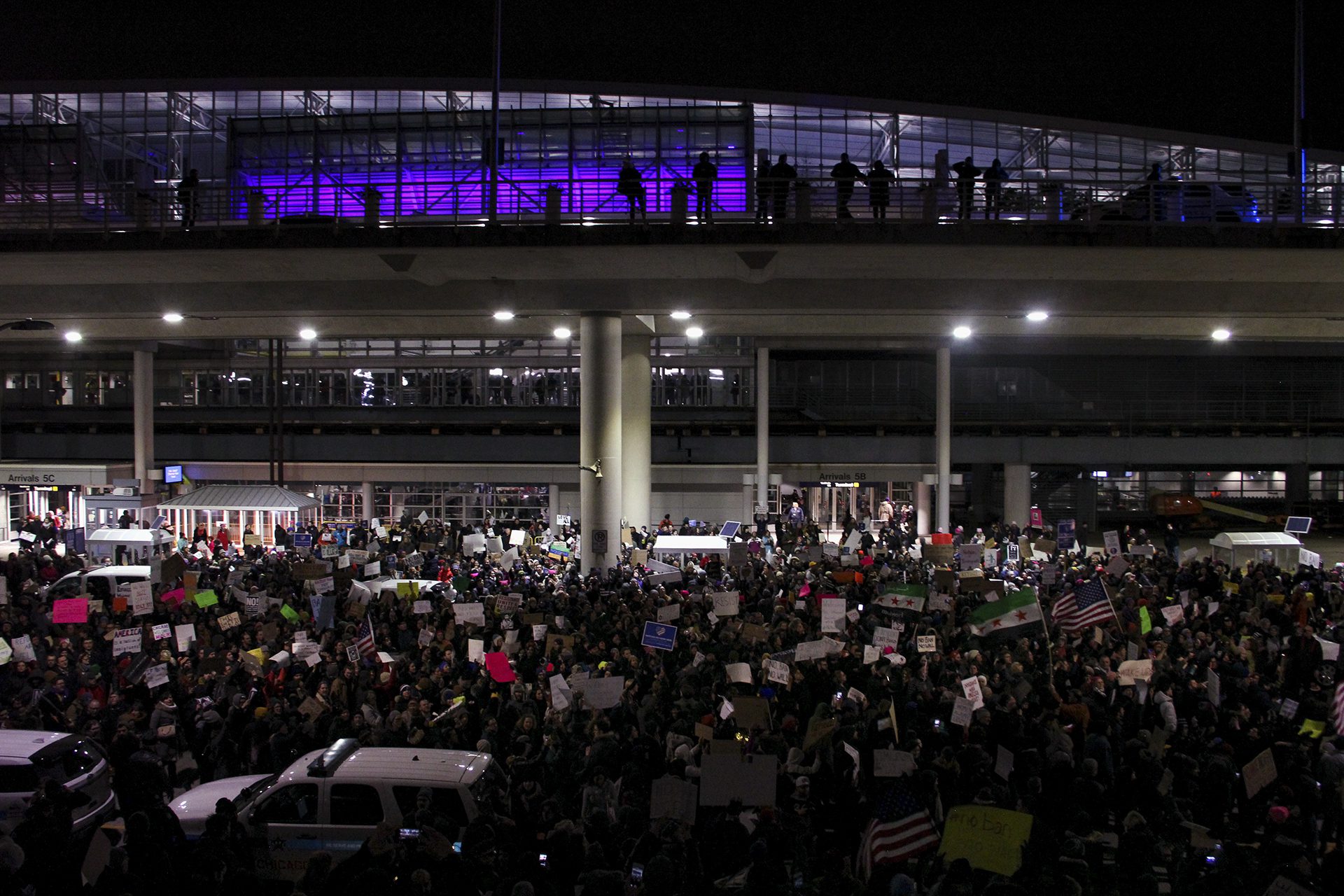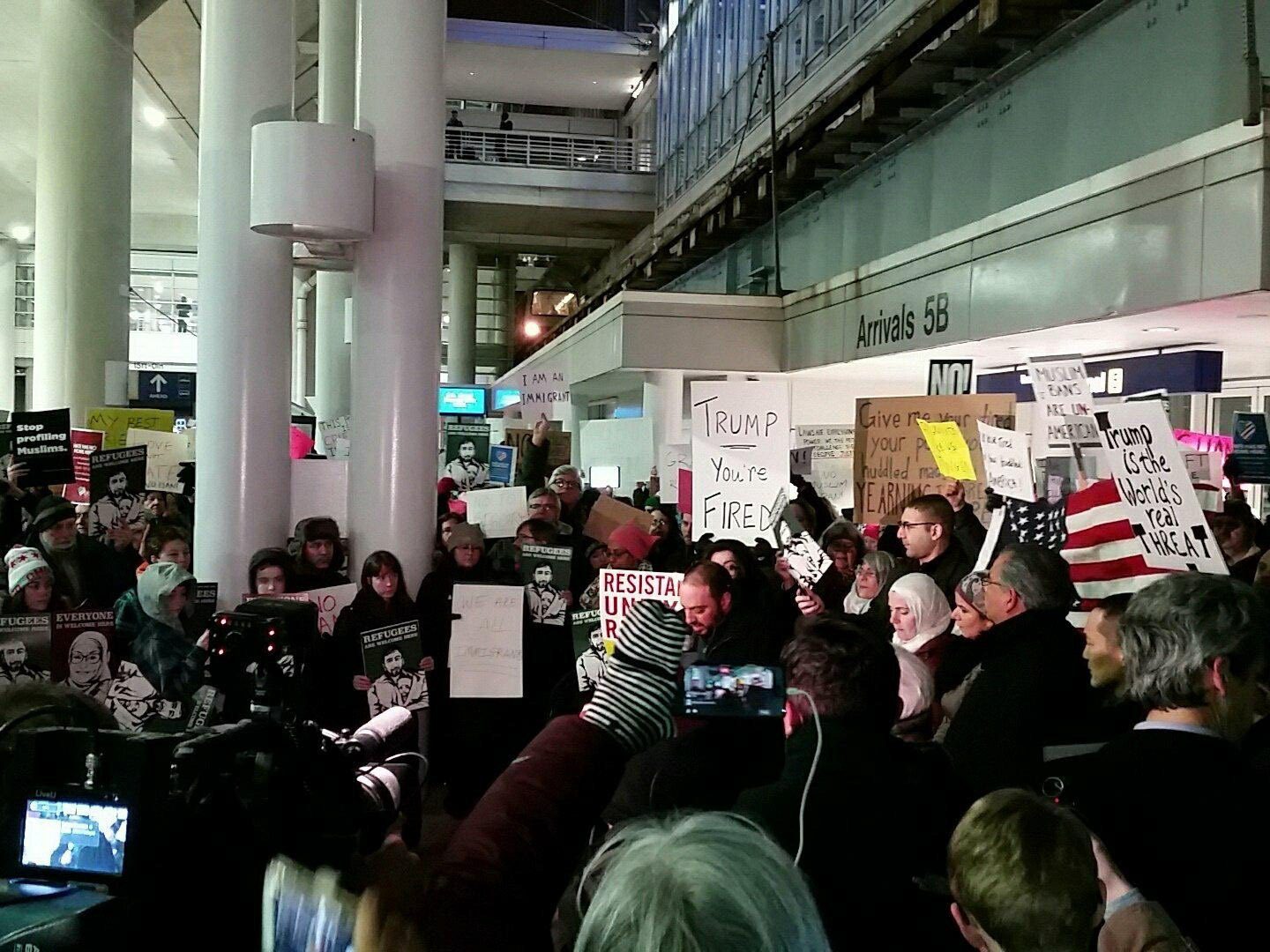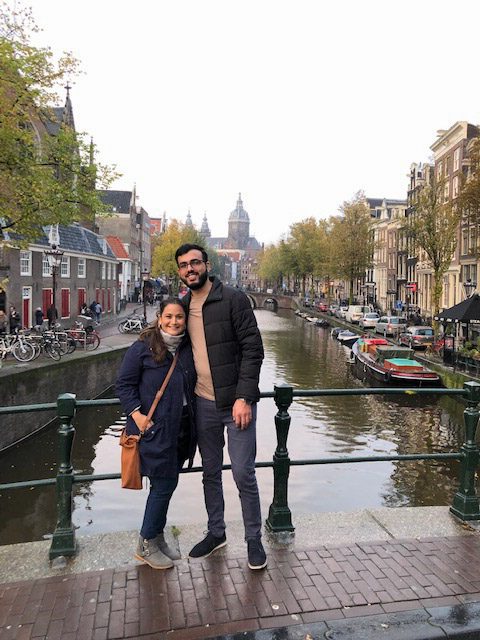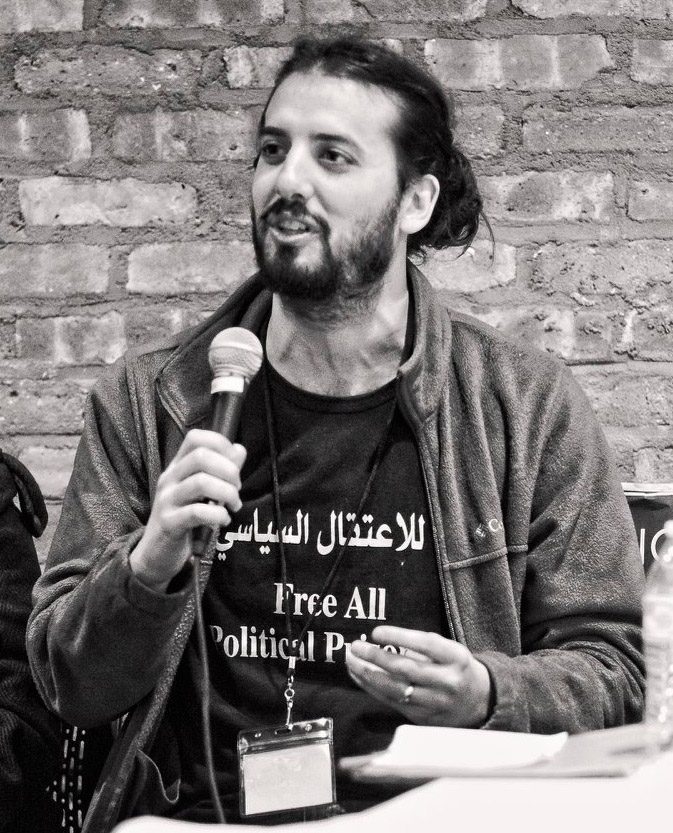 Photo by Hillary Bachelder
Photo by Hillary BachelderFive years after President Trump enacted the Muslim travel ban, Chicago immigrants share how their lives were changed by the policy.
January marked five years since former President Donald J. Trump signed his first executive order, a travel ban that barred Syrian refugees and immigrants from seven predominantly Muslim countries from entering the United States. The days that followed the enactment of what would become known as the Muslim Ban brought mass protests at airports as individuals were detained for hours at customs checkpoints.
Help us continue to provide news on and for immigrant communities in Chicago.
Can you become a member today by donating $5 to mark the fifth anniversary of the Muslim Ban and five years of us doing this work?
“It’s one of those moments where it felt almost like a spark had been lit,” recalled Muhammad Sankari, lead organizer at the Arab American Action Network, who was among the protesters at O’Hare airport after Trump signed the ban. “And everyone, almost subconsciously, knew: ‘We’ve got to go. We’ve got to move.’”
Challenged in court, the Trump administration eventually issued revised executive orders — targeting fewer countries and giving exemptions to visa and green card holders — that federal judges repeatedly blocked. In June 2018, the Supreme Court decided to uphold the administration’s third Muslim travel ban.

The travel ban continued to evolve during Trump’s presidency, with countries occasionally being added and removed. In February 2020, nationals from a total of 13 countries were impacted including Iran, Libya, Syria, Yemen, Somalia, North Korea, Venezuela, Eritrea, Kyrgyzstan, Nigeria, Myanmar, Tanzania and Sudan. Immigrant advocates continued to challenge the ban, arguing that it discriminated against immigrants based on their race and religion.
On his first day in office, President Joe Biden signed an executive order reversing Trump’s travel ban. And while the scrapped ban is no longer in effect, the Biden administration continues to use “administrative processing” to restrict certain immigrants from entering the United States and enact travel bans in the name of COVID-19 control. Five years on, members of Muslim communities worldwide continue to feel the repercussions of travel bans.
Borderless Magazine asked Muslim community members and leaders around Chicago to recount their memories from the early days of Trump’s travel ban and to share their hopes for the future of immigration in the U.S.

‘A Huge Blow to Everything’
Aysha Shedbalkar, a high school math teacher from suburban Northlake who married Rezan Al Ibrahim, a Syrian refugee, during the travel ban
When the ban first went into effect, we had just gotten engaged. We were in the process of getting a fiancé visa and we were hearing on websites and forums that a lot of people who were doing fiancé visas were getting put into an “administrative process.”
We decided after the Supreme Court made their decision that we would just get married and not wait. I think we just really had faith that the Supreme Court would reject the ban. And when it didn’t, I think it was a huge blow to everything we thought we had the rights to.
Read More of Our Coverage
The Supreme Court decision was really that deciding factor that OK, we’re no longer going to wait and wait and wait forever to get married. Let’s just proceed and get married, and we’ll figure it out. And that’s what we’ve been doing.
We got married in March of 2019. Then corona happened. I was supposed to go to Amsterdam [to visit Rezan, whom the United Nations placed there in 2017] for spring break and I decided not to.
Eventually, in July of 2020 I was able to make my way to Amsterdam through the Netherlands’ “sweetheart” visa. Thankfully, my school is amazing and I’m allowed to take a leave of absence from my work. I applied for residency and was able to get it. So I am an official resident here [with Rezan]. Still, I have to go back to the U.S.A. this year because my two-year leave from my school is up. We are still in the process of acquiring our spousal visa. Our hope has always been that Rezan will be in America.

‘Wrong on So Many Levels’
Fiona McEntee, an immigration attorney who worked the triage station at O’Hare Airport on the first day of the travel ban
Saturday morning, we got the email that said: “Just go to O’Hare.” And I will never forget it. I had two kids at home, and I said to my husband, “I’m going.” To my brother who works with me, I said, “Let’s go get in the car and carpool to random attorneys.” We picked them up and went out there. And on the way I was like, I have no idea what we’re going to expect.
We got there and set up a triage. What I saw at O’Hare that day … I’ve never been more aware of the privileged position that I’ve been in, coming to the U.S. as a white, Irish Catholic immigrant.
It was one of the most chaotic things I’ve ever experienced in my life. We ended up speaking to a man who turned into kind of our client on the day. He was waiting for his wife and his child and they were coming from Iran. I’m actually going to get emotional thinking about it. God, it was awful. He was there waiting for hours for his wife, and the baby was 18 months old and was a U.S. citizen.
I had just come through O’Hare airport myself with my two kids, back from Ireland a few weeks before. And I remember how tired I was feeling after a long international flight with the kids, and ours was a direct flight from Dublin. Knowing that this woman, this poor lady, this mom who had a green card was in God knows where for God knows how long in secondary inspection … I was like, this is so wrong. This is wrong on so many levels.

A Spark and a Subconscious Call to Get Moving Fast
Muhammad Sankari, lead organizer at the Arab American Action Network
I feel like there were about three or 4,000 people there on that first day at O’Hare airport, and we ended up shutting down Terminal 5. There were all of these rallies and chanting, there’s thousands of people in the street. And we won. From what I recall, we won the release of a number of people that were being held at O’Hare.
We had called folks to go to the airport. We just said, “Go to O’Hare, go to Terminal 5, that’s the port of entry. Meet us there.” And it’s one of those moments where it felt almost like a spark had been lit. And everyone, almost subconsciously, knew: “We’ve got to go. We’ve got to move.”
Community organizations and community-based grassroots institutions that have been doing organizing work understood that there’s a victory that can be won, if we’re able to mobilize our people right now. And we were able to secure that victory.

A ‘Revamping’ of the Entire Immigration System
Vivian Khalaf, a Palestinian American immigration attorney
Knowing the type of person Trump was and the paving during his campaign of what he was about to do, I personally always believed that he would make good on his promise. And the Muslim community is the scapegoat — always has been and continues to be in many respects. So [the travel ban] didn’t come as a surprise.
But the chaos in the way it was implemented, just the sheerly haphazard way that Customs and Border Patrol was conducting itself … that was a bit too much to digest. What we saw at the airports was just utter chaos.
I’ve always said — and most of my colleagues and advocates in immigration justice will agree — that we need some heavy-duty, comprehensive immigration reform laws on the books that make sense. That the underlying basis for these laws is equality and justice and humanity. We need to advocate for a revamping of the system in its entirety.
This vetting of immigration applicants outside of the United States, many of them from Muslim countries, [ends up in] denials without explanations. So somebody is waiting for years and finally gets to the interview stage. And then the application is denied, for example, and placed in “administrative processing.”
Administrative processing is a black hole with no end and I don’t think it’s random. They say it’s random and that it’s just a second vetting process. I think it’s targeted. And I think it’s focused on certain countries. Many of them are Muslim countries. And that’s just another way to ban a Muslim from coming to the United States rather than doing it through an executive order.
Correction 2/9/22: An earlier version of this article incorrectly stated the year the United Nations placed Rezan Al Ibrahim in the Netherlands.

Bring power to immigrant voices!
Our work is made possible thanks to donations from people like you. Support high-quality reporting by making a tax-deductible donation today.
